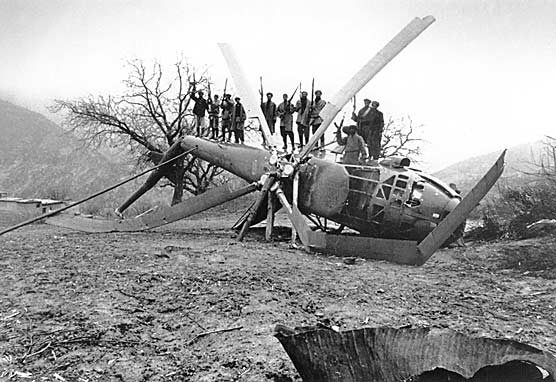During the 1970’s, Soviet-American relations underwent a thawing period, known as the Detente. This period witnessed the cooperation of the two nations in space, strategic arms limitation talks (otherwise known as SALT), and multiple summits and discussions. This period was abruptly ended in 1979 when the Soviet Union, under the orders of its leader Leonid Brezhnev, led an invasion of Afghanistan after internal political tensions between the Afghan Communists and the Mujahideen rebels threatened the stability of the region.
The historical significance of this event is mainly embodied in the collapse of the Soviet Union twelve years after the invasion of Afghanistan. The war put immense stresses on the faulty, centralized economic system of the nation, and along with the radical social reforms set by Mikhail Gorbachev, led to the collapse of the nation. This war would be known as the equivalent to the Vietnam War for the United States, both in economic stresses brought upon by the war, and by the social discontent that it caused.
The sources presented in this annotated bibliography will be organized into two categories. One will present sources pertinent to the war in Afghanistan and the other will present sources pertinent to the effects of the war on the collapse of the Soviet Union. These sources are a compilation of both primary and secondary sources, both electronic and print, presented by qualified professionals who specify in the fields of US-Soviet relations and Soviet history. These sources cover the time period between 1979 and 2010.
War in Afghanistan
Arnold, Anthony. Afghanistan: The Soviet Invasion in Perspective. Vol. 321. Hoover Press, 1985. [Print]
Anthony Arnold provides a right-wing overview of the American perspective on the Afghanistan war. Arnold wrote this book at the point in time when the war reached the point of stalemate. He gives an in depth analysis of why the stalemate occurred, and how this war mimics the pressures of the Vietnam War for the United States.
Collins, Joseph J. The Soviet Invasion of Afghanistan: A Study in the Use of Force in Soviet Foreign Policy. Lexington books, 1986.[Print]
Joseph Collins explores the relations between the Soviet Union and Afghanistan, and how the manipulation of those relations by both parties led to the crippling of the Soviet Union. He emphasizes the significance of Afghanistan to the Soviet Union, in terms of economic prospects and especially the expansion of Soviet influence, and how the drive to surround itself with communist regimes eventually led to the demise of the Soviet Union.
American response
H.R 30, 97th Cong (1981-1982) http://thomas.loc.gov/cgi-bin/bdquery/D?d097:30:./list/bss/d097HE.lst:: [Primary]
This housing resolution, sponsored by Peter A. Peysor, a representative from New York, urged the president to continue the embargo on exports of agricultural commodities to the Soviet Union, as a result of their continued occupation of Afghanistan. This resolution is an indication of the western disapproval of the actions of the Soviet Union. Representative Peysor aimed to use the embargo as a means of crippling the Soviet economy to the point where they would be forced to withdraw out of the region.
Soviet Justification.
BBC Summary of World Broadcasts. “‘Pravda’ on Afghanistan: Soviet military aid justified.” Date Accessed: 2013/04/08. www.lexisnexis.com/hottopics/lnacademic.
Using the LexisNexis newspaper database, I was able to find an article in the BBC Summary of World Broadcasts which summarized an article defending the Soviet incursion in the Soviet news agency “Pravda”. This summary sheds light on the Soviet perspective on the situation, and the reasoning behind the invasion. The article unveils a fear of being surrounded by capitalist countries, pushing the regime to make the drastic decision to intervene in Afghanistan.
Soviet withdrawal
Australian Financial Review. SOVIET UNION MOVES TO WITHDRAW AFGHAN REGIME.” December 29, 1988 Thursday . Date Accessed: 2013/04/08. www.lexisnexis.com/hottopics/lnacademic.
This news article, written eight years after the Pravda article previously mentioned, announced the Soviet withdrawal from the region, after sustaining heavy casualties and not making any significant gains in area of control. It talks about how the Soviet Union believed that this would be an easily won war, and how this war turned out to be disastrous for the soviet economy and faith in the regime.
Economic impacts on the Afghan region
Defense Intelligence Agency, Directorate for Research. “The Economic Impact of Soviet Involvement in Afghanistan,, May 1983 (DIA Declassification Release, 1999) [Primary]
This is a declassified document release from the CIA, written in 1983, analyzing the economic impacts of the Afghanistan war not only on the Soviet economy, but the economy of Afghanistan, depicting the disastrous effects of the war on the Central Asian trade. This document analyzes the mismanagement of scarce resources by the Soviet backed government in Kabul, and how this economic mismanagement is threatening the stability of the country.
Collapse of the regime
Schweizer, Peter. Victory: The Reagan administration’s secret strategy that hastened the collapse of the Soviet Union. Atlantic Monthly Pr, 1994. [Print]
Peter Schweizer depicts the accounts of the Reagan administration through the 1980’s as they set to weaken the Soviet Union through economic and military means, and through the application of covert pressure on its satellite nations. Schweizer gives an in-depth analysis of how the economic stresses of the war in Afghanistan amplified the effects of economic embargos set by the United States and NATO.
Gorbachev, Mikhail. Memoirs. London: Doubleday Press, 1996. [Primary][Print]
Mikhail Gorbachev, the last head of state before the collapse of the Soviet Union, depicts his life through the evolution of the soviet state and his eventual rise to power. He describes the harmful effects of the Afghan war, and how he attempted to thwart the damage done to the social structure of the state, by instating democratizing reforms such as Glasnost’ and Perestroika. His account helps the researcher get a perspective on the collapse and how the war in Afghanistan influenced the collapse, and how the problems caused by the conflict were dealt with at the seat of power.
